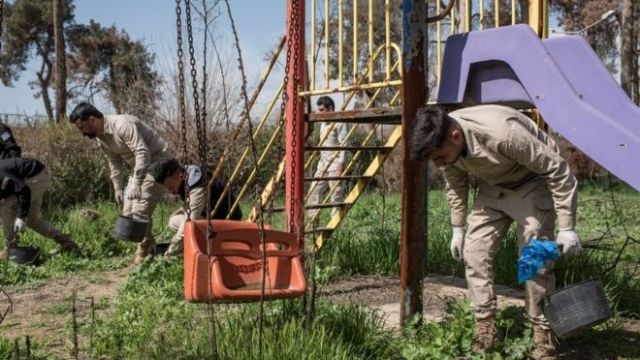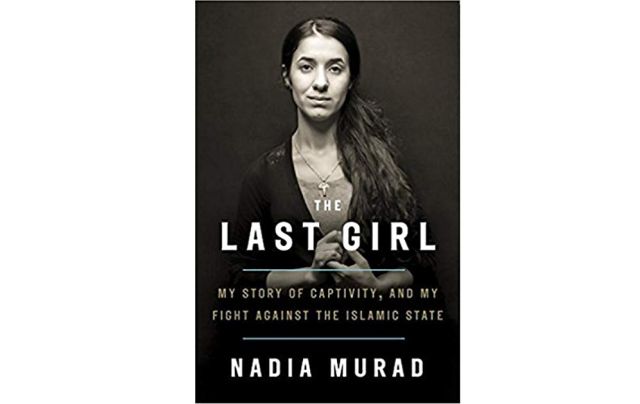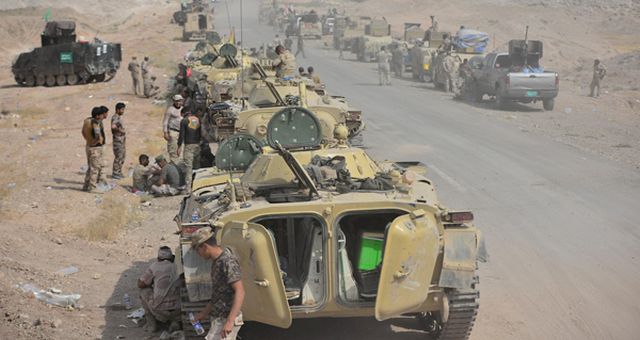
by admin | May 25, 2021 | World
 London : The United Kingdom is to give an extra £5 million to help clear explosives planted by so-called Islamic State (IS) in Iraq, the government has announced.
London : The United Kingdom is to give an extra £5 million to help clear explosives planted by so-called Islamic State (IS) in Iraq, the government has announced.
The Department for International Development (DfID) funding is in addition to the £24.9 million the UK has contributed to demining projects in the country since 2015. The money will be given to the United Nations Mine Action Service (UNMAS).
According to the BBC, the UK is committed to spending 0.7 percent of gross national income on overseas aid – spending £14.1 billion in 2017. The biggest recipients were Pakistan, Nigeria, Ethiopia, Syria and Somalia.
About 1.8 million people are still displaced in Iraq and DfID says removing explosives from schools, hospitals and roads will help the country to return to normality.
In 2018, 16,500 explosives, 800 suicide belts and 2,000 explosive traps were cleared from the country. Teams have cleared locations including a hospital used as IS’s headquarters in Mosul, where 3,500 explosives were found and a school in Fallujah rigged with 13 IEDs.
The funding will support six explosive clearance teams across the Iraqi Sinjar province, an area with a large Yazidi population that has been one of the worst affected by the occupation by IS militants.
Iraq’s government announced in December 2017 that its war against IS was over, almost four years after the group, which is also known as Daesh, first seized parts of the country.
International Development Secretary Penny Mordaunt said: “Daesh’s sickening use of explosive traps continues to threaten children in their schools, mothers in hospitals and thousands of innocent people trying to return to a normal life.”
“Thanks to this UK aid funded work, people can return to work, children can go back to school and lives are slowly being rebuilt,” he added.
—AB/UNA-OIC

by admin | May 25, 2021 | Books
 By Saket Suman,
By Saket Suman,
Book: The Last Girl; Author: Nadia Murad; Publisher: Vergo Press/Hachette India; Pages: 306; Price: Rs 499
She suffered at the hands of the Islamic State, was held captive as a sex slave, but went on to become a human rights campaigner and was awarded the 2018 Nobel Peace Prize jointly with Congolese gynaecologist Denis Mukwege. In her memoir, “The Last Girl”, Nadia Murad recalls the dreadful sequence of events that led to her captivity and reflects on the life she has been leading thereafter.
It is a painful story, of a life shattered all of a sudden, that left Murad with little hope of freedom. But it inspired her to visualise a change in the world — with the powerful weapon of her own story as the instrument of change.
In August 2014, Islamic State militants laid siege on Murad’s village, Kocho, in Iraq. The militants showed no mercy and first executed almost all the men and older women, which included Murad’s mother and six brothers. All of them were buried in mass graves as younger women like Murad, who were spared, looked on hopelessly.
The younger women were then kidnapped by the IS militants and were sold as sex slaves, where they were held captive, tortured and raped by several militants. She was barely 21 years old, but the militants knew no mercy.
“The slave market opened at night. We could hear the commotion downstairs where militants were registering and organising, and when the first man entered the room, all the girls started screaming. It was like the scene of an explosion. We moaned as though wounded, doubling over and vomiting on the floor, but none of it stopped the militants,” she recalls in the memoir, first published in the United Kingdom by Virgo Press, and now here by Hachette India.
She adds that the militants paced around the room, staring at them, while they screamed and begged.
“They gravitated toward the most beautiful girls first, asking, ‘How old are you?’ and examining their hair and mouths. ‘They are virgins, right?’ they asked a guard, who nodded and said, ‘Of course!’ like a shopkeeper taking pride in his product. Now the militants touched us anywhere they wanted, running their hands over our breasts and our legs, as if we were animals,” Murad recounts.
After she was sold to a jihadist in Mosul, an opportunity to escape arrived when she found the front door unlocked. Murad escaped to Kurdistan, posing as the wife of a Sunni man, Nasser, who literally risked his life and everything he had to take her to safety.
But the relief did not last long as Murad and Nasser were detained by Kurdish officials and forced to testify about their escape.
“I was quickly learning that my story, which I still thought of as a personal tragedy, could be someone else’s political tool,” she notes.
In early 2015, Murad went as a refugee to Germany and later that year she began to campaign to raise awareness of human trafficking. She was invited to Switzerland to speak at a UN forum on minority issues.
“It was the first time I would tell my story in front of a large audience. I wanted to talk about everything — the children who died of dehydration fleeing ISIS, the families still stranded on the mountain, the thousands of women and children who remained in captivity, and what my brothers saw at the site of the massacre.
“I was only one of hundreds of thousands of Yazidi victims. My community was scattered, living as refugees inside and outside of Iraq, and Kocho was still occupied by ISIS. There was so much the world needed to hear about what was happening to Yazidis,” she writes.
In the memoir, Murad maintains that her story, “told honestly and matter-of-factly”, is the best weapon she has against terrorism. She emphasises that she plans on using it until the terrorists are put on trial, and reminds those in power that there is still so much that needs to be done. She urges the world leaders, particularly Muslim religious leaders, to stand up and protect the oppressed.
Murad says in the book that she wishes to look into the eyes of the men who raped her and see them brought to justice. And she is vocal about her sufferings as well as what she wants the authorities to do because she, as the title of her memoir says, wants to be “The Last Girl” with a story like hers.
(Saket Suman can be contacted at saket.s@ians.in)
—IANS

by admin | May 25, 2021 | Muslim World, Opinions
 By Saeed Naqvi,
By Saeed Naqvi,
The final shootout in the old Wild West movies has the camera dwell on the blaze engulfing the Sheriff’s office. The Sheriff leads the charge into the saloon where the bad men lounge around.
If this analogy is to be applied to the final blow up taking place in West Asia, particularly since the Russians entered Syria in 2015 to help fight “terrorist outfits” like Jabhat al Nusra, Al Qaeda, ISIS and so on, the script will have to be expanded on an epic scale, focused not on one saloon but on a series of them, serving clusters of homesteads. Kobane, Aleppo, Idlib, Hama, Homs, Palmyra, Mosul, Raqqa, Kirkuk….
I can set the scene for the script having travelled to Homs, Hama, Daraa at the outset when US Ambassador Stephen Ford was promoting democracy, meeting insurgents. It was an open road show.
Americans had said at the very outset of their involvement in Syria that they would not have boots on the ground. The Russians had indicated no such squeamishness. In other words, Russians would have a ringside seat on Americans’ messy involvement with Nusra here or Al Qaeda there.
These gangs were instantly transformed into freedom fighters whenever there was need. Simply put, terrorists fighting Syrian President Bashar al-Assad were freedom fighters, worthy of support in training with lethal weapons. But Assad fighting terrorists was foul: he was a thug, thwarting democracy. Heads I win; tails you loose. Of course, there must be excesses committed by Assad, like us in Kashmir, but the larger context dwarves these.
If you find my tone at a variance from what you have seen and read on Syria, do please watch Congressional hearings with Army Commanders managing the Syrian show. Not to be missed is the hapless Defence Secretary, Ashton Carter, admitting before a full press corps how a $500 million programme to train Syrians had to be abandoned because the trainees handed their weapons to Jabhat al Nusra and found safe passage to few know where.
The mad pursuit for a New Middle East, repeatedly thwarted, keeps resurfacing, hydra-like. The driving force behind the neo con dream has metastasized into all sorts of outlandish and frightful scenarios.
Has the strategic community forgotten founder of Blackwater, Eric Prince’s idea of “governing” Afghanistan exactly as the British governed India in early 20th century – under a “Viceroy”? Yes, the written proposal was under active consideration of the President of the US last summer, with his adviser Steve Bannon grinning from ear to ear at the prospect of Afghan raw materials funnelled suitably into Trump’s “America first” receptacle. Read the Atlantic magazine on that theme. The deal was almost done.
Never mind if they were not allowed to reinvent the British empire in Afghanistan. The world’s biggest provider of mercenary fighting units controls other fiefdoms. They are part of the core group advising the Abu Dhabi ruler. Thanks to Blackwater, Latin American soldiers are fighting for the Saudis in Yemen. How will countries like Colombia utilize their citizens trained and tested in combat when they return home? Bogota may not have the money to afford Blackwater, but surely Trump may find battle-ready Colombians useful against a country on his hit-list: Venezuela.
The most sinister part of the post 9/11 wars inaugurated by the US in West Asia is their endlessness. This has become so, particularly after the Afghan and Iraqi experience. The US learnt at great cost that troops in both theatres were inextricably bogged down in the quicksand. Wisdom dawned. Air power, missiles, drones would provide cover, if needed, to “indigenous” foot soldiers, armed to the teeth with fierce Jihadism and financed, well, by Saudi Arabia. Qatar, Turkey, the Emirates have all had their hand in this till.
In its first, experimental stage this Jihadism was able to push back Soviet power from Afghanistan in 1989. The carelessness with which the US turned its back on this high voltage takfirism was stunning. US strategist Zbigniew Brzezinski’s terse comment was typical: “We were focused on bringing down the Soviet Union; we were not worried about some stirred up Muslims.”
These “stirred up” Muslims boomeranged in Kashmir, Cairo, Algiers. Post 9/11 wars, with Jihadist foot soldiers, has left a rich crop of Jihadists in platoon and company strength.
Robert Fisk, authoritative journalist on West Asia, has a telling piece in The Independent: “ISIS has lost Raqqa – so where will its fighters head to next?” The Syrian Democratic Forces, mostly Kurdish, backed by the Americans, were supposed to be fighting the IS.
What has actually happened is mind boggling. US air power has flattened Raqqa on the scale of Dresden in World War II. But by Fisk’s testimony, 275 IS fighters have been freed to go where they like. Deir ez-Zzor is one destination. But they can be relocated far afield to unsettle any targeted society with a Muslim minority.
The Moscow initiative on Afghanistan had anticipated some of this. When China, Iran, Afghanistan, Pakistan and eventually even India and several Central Asian countries met in Moscow last April, the main item on the agenda was that Taliban, being an Afghan National entity, should be incorporated in Kabul’s power structure. The move would isolate the IS, Al Qaeda and their affiliates and thus prevent them from unsettling countries in the region.
The Moscow initiative came after Trump’s announcement: he would drastically scale down in Afghanistan. But, true to form, Trump changed his mind. He is now embarked on an open ended involvement in Afghanistan – with all accompanying dangers. In the name of fighting the IS, Afghanistan may end up becoming a hatchery for multiples of IS and Al Qaedas. The Mujahideen will have come full circle.
Has Islamic militancy increased since the global war on terror was launched? An honest answer will place this piece in perspective.
(A senior commentator on political and diplomatic affairs, Saeed Naqvi can be reached on saeednaqvi@hotmail.com. The views expressed are personal.)
—IANS

by admin | May 25, 2021 | Muslim World
 Baghdad : The Iraqi security forces on Saturday seized two oil fields in second phase of offensive to dislodge the extremist Islamic State (IS) militants from Hawijah and surrounding areas, the Iraqi military said.
Baghdad : The Iraqi security forces on Saturday seized two oil fields in second phase of offensive to dislodge the extremist Islamic State (IS) militants from Hawijah and surrounding areas, the Iraqi military said.
The security forces managed to free the oil fields of Allas and Ajil in the eastern part of Iraq’s northern central province of Salahudin, after two days of clashes with IS militants, a source from Salahudin Operations Command, told Xinhua on condition of anonymity.
By Saturday evening, the troops recaptured all the oil wells of the two oil fields and seized the nearby Himreen mountain range in south of the IS-held city of Hawijah, which itself located some 230 km north of Baghdad, the source said.
Before the offensive, the IS militants seized roughly 100 oil wells of the 200 wells of the two oil fields, and they used to extract crude oil and refine it in primitive ways, leaving many nearby valleys filled with leaked oil, he said.
The militants set fires in some 34 oil wells, some of them were on fire for about three years since the extremist group captured the area in 2014, the source added.
In the past, Ajil oil field used to give some 35,000 barrels per day (bpd). The two oil fields, Allas and Ajil, were seized by IS militants following the June 10 blitzkrieg when the group seized large swathes of territories in predominantly Sunni provinces.
The oil fields became an important source of funding for the IS group, which extracted about 10,000 bpd and transported to others areas under its control.
The battles in the oil fields were part of an offensive began on Friday when the Iraqi Prime Minister Haider al-Abadi announced the launch of the second phase of offensive to dislodge the extremist IS militants from their stronghold in the city of Hawijah and surrounding areas.
“We announce the start of the second phase of the liberation of Hawijah and all the surrounding areas to the west of Kirkuk, and as promised the sons of our country are continuing to liberate every inch of the land of Iraq and crush the gangs of terrorist Daesh group,” said Abadi in a statement.
The first phase of the operation was launched on Sept. 21 to liberate Hawijah in the western part of Iraq’s oil-rich Kirkuk province.
The operation to free Hawijah came as tensions are running high between Baghdad government and the semi-autonomous region of Kurdistan after the Kurdish region held a controversial referendum on independence of Kurdistan and disputed areas, including Kirkuk.
The independence referendum was opposed by many countries because it would threaten the integrity of Iraq and it could undermine fight against Islamic State militants.
In addition, neighboring countries such as Turkey, Iran and Syria see that such a step would threaten their territorial integrity, as larger populations of Kurds live in those countries.
—IANS

 London : The United Kingdom is to give an extra £5 million to help clear explosives planted by so-called Islamic State (IS) in Iraq, the government has announced.
London : The United Kingdom is to give an extra £5 million to help clear explosives planted by so-called Islamic State (IS) in Iraq, the government has announced.


